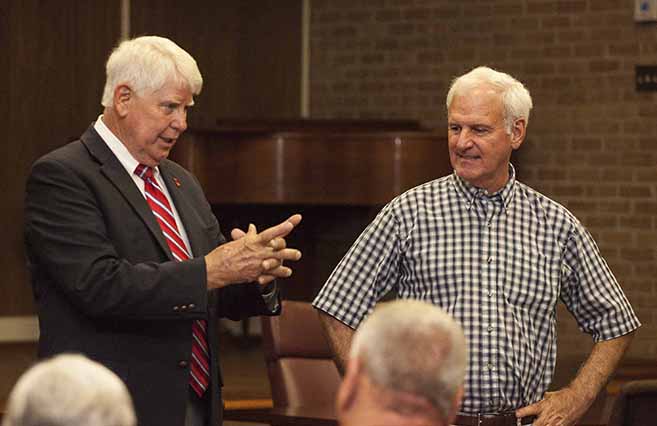
By DON FLETCHER
News Staff Writer
Congressman Bradley Byrne answered questions on issues of local, regional, state and federal significance during a Monday, August 13, town hall meeting in Atmore.
Byrne, who represents Alabama’s 1st District in the U.S. House of Representatives, praised the recent restructuring of Medicare reimbursements to Alabama’s hospitals, labeled as “ridiculous” the proposed toll bridge in Mobile and expressed regret that farmers have been caught in the crossfire of a major international trade dispute between the U.S. and China.
Byrne’s most positive comments were about the partial dissolution of a Medicare reimbursement system that penalized rural hospitals and hospitals in states with a large rural population by paying them less for certain procedures than other medical facilities were paid.
“The local hospital can speak for itself, but I’m told by the Alabama Hospital Association that this is a major shot in the arm for hospitals all over the state, but particularly for our rural hospitals,” the congressman said. “This (the Medicare Wage Index, on which reimbursements were based) has been messed up over time and has gotten worse and worse and worse. It has gotten to where the average hospital in Alabama is getting 20 percent less than the average hospital in America.”
He said the MWI method just didn’t make sense.
“If Atmore hospital does a procedure, they’re going to get 20 percent less than a hospital in Pensacola would, for the same procedure,” he explained. “The machines don’t cost any less for Atmore, and the people — you’ve got to have good doctors and nurses — are going to be paid pretty much the same. There’s really no difference in what Pensacola did and what Atmore did, but Atmore would get 20 percent less for it.”
He said the AHA and the hospitals officials with whom he has talked feel like the amended Medicare rules could be the saving grace of several rural medical centers.
“This doesn’t completely close that gap, but it substantially does,” Byrne said. “I am told by the Alabama Hospital Association that this will literally mean the difference between a lot of rural hospitals staying in business and not staying in business. It’s not the end of the line, as far as what we need to do for our hospitals, but it’s a huge step forward.”
Byrne, who was elected to his House seat in 2014, didn’t pull any punches when the discussion got around to a proposed toll bridge in Mobile.
He said the proposed $90-per-month, per-car fee for using the as-yet-unbuilt bridge has created a “perfectly predictable firestorm” that just won’t work.
“I’m philosophically against tolls,” he said. “I think we pay our gas taxes, so we should be able to drive on any U.S., state or county roads. I’ve suggested other options, but the Department of Transportation swept those suggestions aside. People will have to pay $90 a month just to drive back and forth to work. That is not at all realistic, and people just won’t pay it.”
He added that construction of the massive bridge would serve only to shift a major traffic problem to another area.
“The traffic problems we now have on I-10, we’ll move that problem to the Causeway and turn the Causeway into a parking lot,” he said.
On the recently imposed tariffs on Chinese goods, Byrne said he supported the move to some degree, but lamented the fact that American farmers have become “collateral damage” in the dispute.
“I’ve met with a lot of farmers around the state about that issue, and it is hurting them,” he admitted. “China is a major problem for the U.S., but it’s extremely important that we get this right. But right now, our farmers are collateral damage, and I don’t like them being collateral damage. I don’t think the president wants them to be collateral damage.”
The U.S. Representative talked briefly about several other issues, including anticipated budget cuts for the state’s National Guard, including the possible closing of several armories. He also answered questions about a proposal to have mental health experts accompany police in many instances, as well as proposed changes in gun control laws, the sale of public lands, inflammatory campaign rhetoric and an apparent move by the federal government to stymie the exercise of religious freedom.
“There’s some new legislation, and it’s called The Equality Act,” he reported. “In that bill, they have repealed the Religious Freedom Restoration Act. Now, when the government does something that would burden a religious act, under (The Equality Act), if I sue, the government wins the cases three-fourths of the time. They want to put it where people of faith can never beat the government.
“That is, to me, an over-extension of federal power. They are trying to take your right and my right to freely exercise our religion, and that’s wrong.”
The town hall gathering lasted about 50 minutes, after which the congressman shook hands and chatted with several locals.
